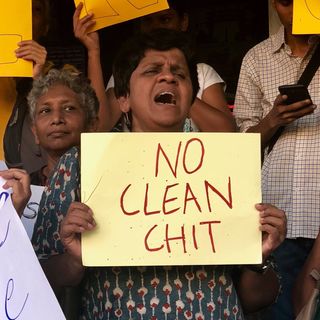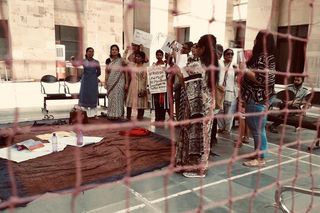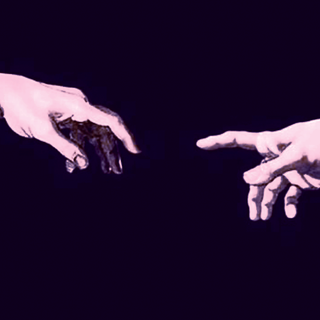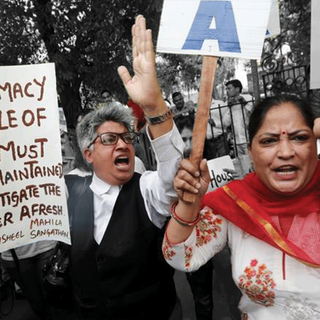
#SupremeInjustice: I Was Detained for Protesting the SC’s Clean Chit to the CJI
“What you do is wait, exhausted and hungry, wondering how much longer.”

When the police bus pulls into Mandir Marg Police Station, the women climb off sing-songing “hello!” “hum phir se aa gaye (we’ve come again),” “thoda sa nimbu pani pila dijiye (give us a little lemonade, please).”
The policeman stationed to receive them asks smiling, “kya hua?” meaning what are they here for this time. On being told for protesting sexual harassment, he asks “woh kya hota hai? (what is that?)” He waves off the explanation with, “yeh sab humare samajh ke bahar hai (it’s beyond our understanding).”
One of the women, a lawyer, simplifies: “Ladki ko chheda (teasing a girl).” He gets it now.
“Toh phaansi (hanging, then),” he says cheerfully, conclusively.
It is May 8, the second day of protests in the national capital. Nine women — a mix of veteran activists, students and professionals from social justice organizations — have been detained for protesting the ‘clean chit’ to the Chief Justice of India, Ranjan Gogoi, regarding the sexual harassment and victimization alleged against him by a former Supreme Court staffer.
In a series of unprecedented events, the allegations were declared a conspiracy to undermine the independence of the judiciary. Among other examples of what circulating protest-posters are calling “dude process,” the Bar Council of India issued a notice urging the country to “rise to the occasion” against this conspiracy — additionally maligning the complainant as “not a simple woman,” and bemoaning the “prevalence of false cases.”
Following the complainant’s withdrawal from the in-house committee, led by Justice Bobde, which flouted the Prevention of Sexual Harassment against Women at the Workplace (POSH) Act and denied her legal support, the inquiry dismissed the allegations as “lacking substance” on May 6. The report has neither been made public nor shared with the complainant — who consequently cannot file a writ petition appealing it.
Since May 7, women have been protesting. Friday, May 10, is the last working day of the Court before summer vacation, and the autonomous women’s movement is determined not to let this fall into chalta hai (ok, whatever) territory. However, after 52 protesters were picked up within five minutes of protest on Day One, the numbers — of protesters and press — have dwindled. On May 8, the site of protest had shifted from outside the Supreme Court to Rajiv Chowk Gate, with the information kept relatively secret, to ensure scope for protest before the police turn up to impose Section 144 of the Criminal Procedure Code, which empowers a magistrate to bar the assembly of more than four people who gather without permission.
Related on The Swaddle:
Women Organize #SupremeInjustice Protests As A ‘Last Resort’
Still, at 11 a.m. even before it begins, police women are gathered, and the water cannon and police buses are lying in wait. Of the nine women pushed into the bus in the first round, I lie low and document everything on my smartphone. Within the next hour, there will be 16 of us — detained until 3:30 p.m., when they finally let us go.
*
Once inside, there’s a routine. The courtyard is swept for us, and some protesters help in spreading a durrie (rug) down. The policeman from outside is being chatty about the kind of trouble that happens in the ‘gaanv (village)’ which we city women don’t know about.
He shows me a news article on his phone — a recent case in Rajasthan where a couple was assaulted, and a video of the woman being gang raped went viral. This happened on April 26, he says, and despite going to the thana (police station), no action was taken for a while. He tells me thrice to tag the Senior Superintendent of Police and the Chief Minister on Twitter.
“Iske liye sangharsh karo (Strive for this), madam,” he says.
*
After the initial burst of chanting slogans and expressing protest, the protesters wait for hours on a 40-degree summer day in the open courtyard. When you’re detained but not arrested, you can’t be put in a cell, so you’re stuck — outdoors, but inside the gates. You cannot be bailed out, either.
What you do is wait, exhausted and hungry, wondering how much longer, and refuse to give your name when asked, defiant in numbers. If able to access the spotty internet on your phone, you contact lawyers, allies, and post sporadic updates on Twitter. People on the outside amplify the specific hashtag #SupremeInjustice, and call the station landline asking how a peaceful protest can be clamped down this way. The police try not to answer them.
One reason appears to be that they don’t know why we’re here other than ‘orders from above’ — presumably the Deputy Commissioner of Police’s office, the only person who can ‘officially’ speak on the matter. At one point, we see that the Station House Officer has told a journalist that no one has been detained, and there’s a ruckus as the women demand to be let go. It doesn’t happen.
‘Orders from above’ appear to have played a role in the victimization of the complainant and her family following the sexual harassment. In an extensive interview released yesterday, she describes the false FIR against her, being arrested late at night, being ‘shackled at the feet’ and her husband being beaten in police custody. She had to obtain bail, which the police have since applied to cancel.
In contrast, the policewomen are blandly nice to us. One even offers to lend me her phone charger, and asks if I’m a student. They do not at any point confiscate our phones — our privileged avenue of resistance.
On the second day of the Bobde committee the complainant was told “mere haath mein toh kuch nahi hai, sab upar se aayega (it’s out of my hands; higher authorities will decide).”
*
In the police bus, the activists stuck their head out the windows to the media cameras. “Clean chit down, down,” they shouted as the bus drove away.
Troublingly, the Bar Council’s rhetoric seems to be conflating the individual with the institution; CJI Gogoi equals to the judiciary — despite, and because of the breach of law involved.
Instead of meeting this exceptional situation by developing processes in accordance with the POSH Act, the judiciary’s hurry to absolve CJI Gogoi sets a new low for impunity around sexual violence, given India’s already abysmal legacy of state-sanctioned patriarchal violence and caste-atrocity. That the Bar Council’s insinuation of the complainant not being a “simple woman” is rootedin a case involving the Prevention of Atrocities (POA SC/ST) Act is even more shameful.
Related on The Swaddle:
CJI Sexual Harassment Report And Response Prove Women have No Recourse
Outside the instant gratification of distant social media shaming that something like #auntyjiapologize (a recently viral video of a woman making comments propagating ‘rape culture’) offers, in the post-MeToo wave, structural accountability for sexual assault seems further away than ever at this moment. And so while detained, the activists occupy their time by strategizing the next day’s protest — how far can matters be pushed before charges are actually filed against them?
These are the ‘professional protesters,’ as the Centre has repeatedly and derogatorily referred to them in defending the repeated imposition of Section 144 in Delhi. An important question to consider here is what stops protest? A regular 9-to-5 job, for one — work that does not include social justice. Another deterrent is violence, such as that faced by the complainant and her family. However, those lower on the scale of privilege cannot afford to be deterred by the risks protesting entails, as the alternate consequences are much worse.
*
There are other deterrents, too — more insidious forms of violence. One of the protesters, V, tells me, “Look how they’re keeping us here since morning — just taking all our time against our will. There’s no water cannon involved, no manhandling, but they won’t let us leave.” So it is a kind of violence.
When we finally leave, several of us straggle to the metro in the heat. I sit next to a protester from the National Alliance of People’s Movements. She is already coordinating the next day’s protest on her phone. “How will people have the energy?” I ask.
In the kind of work she does, protests involve much more explicit violence and arrests, she tells me. And there is no media attention for such cases. “So, when there’s media attention like here, we have to,” she says. Like we owe it or something.
Riddhi Dastidar is a writer and researcher in Delhi who works on disability justice, gender, climate, and culture. They lead "Sound, Fury & 4G," a longread series on technology, gender, and development for the rural feminist media house, Khabar Lahariya. They are also a mental health reporting fellow with IndiaSpend. In 2020, they won the TFA award for poetry. Follow them on @gaachburi everywhere.
Related


Are We Becoming Less Empathetic by Choice?
